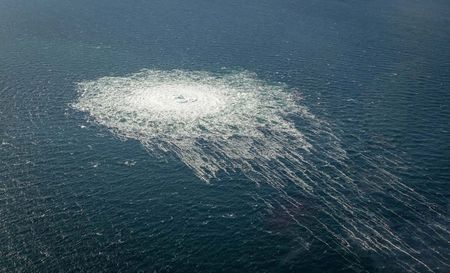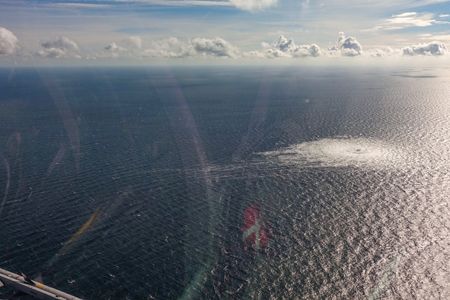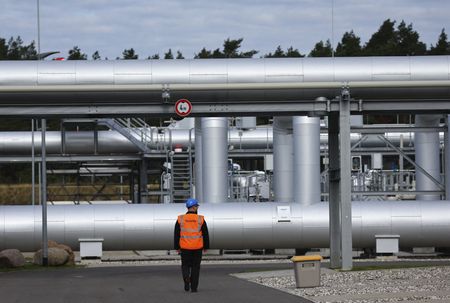 1
1 1
1





By Paul Carrel and Stine Jacobsen
BERLIN/COPENHAGEN (Reuters) – Any intentional disruption to EU energy networks would meet a “robust and united response”, its top diplomat said, after several states said two Russian pipelines to Europe had been attacked, causing gas to spew into the Baltic Sea.
It remained far from clear who might be behind the leaks or any foul play, if proven, on the Nord Stream pipelines that Russia and European partners spent billions of dollars building.
Russia, which slashed gas deliveries to Europe after the West imposed sanctions over Moscow’s invasion of Ukraine, has also said sabotage was a possibility.
The European Union believes sabotage probably caused the leaks detected on Monday, Josep Borrell said, echoing views aired by Germany, Denmark and Sweden.
The EU has not named a potential perpetrator or suggested a reason for the suspected sabotage.
“Any deliberate disruption of European energy infrastructure is utterly unacceptable and will be met with a robust and united response,” Borrell said.
A statement issued by Russia’s embassy in Denmark said that any sabotage on Nord Stream’s pipelines was an attack on both Russia’s and Europe’s energy security.
“The unsubstantiated accusations and assumptions that are now being made everywhere are intended to create information noise and prevent an objective and impartial investigation,” the Russian statement said.
The Nord Stream pipelines have been flashpoints in an escalating energy war between capitals in Europe and Moscow that has damaged major Western economies, sent gas prices soaring and sparked a hunt for alternative supplies.
Map: Leaks reported from Russian Nord Stream pipelines: https://graphics.reuters.com/UKRAINE-CRISIS/ENERGY/xmpjozoewvr/leakage-map.jpg
SECURITY ALERT
Denmark’s defence minister said after a meeting with NATO General Secretary Jens Stoltenberg that there was reason to be concerned about the security situation in the region.
“Russia has a significant military presence in the Baltic Sea region and we expect them to continue their sabre-rattling,” Morten Bodskov said in a statement.
Norwegian police said on Wednesday they have reinforced security around the country’s oil and gas installations, while Danish authorities have asked that the level of preparedness in the country’s power and gas sector be raised.
In the Baltic Sea, the volume of gas bubbling from the Nord Stream 1 pipeline was unchanged on Wednesday from the previous day, the Swedish Coast Guard said in an email to Reuters.
Denmark’s Bodskov said it might take a week or two before the areas around the leaks were calm enough to be investigated, while there were differing views over potential repairs.
“There are good teams in place to handle pipeline accidents, there are emergency pipe inventories and experts for onshore and offshore,” Jens Schumann, managing director of gas pipeline grid company Gasunie Deutschland, said.
“That makes me relatively optimistic that even a ruction like the one we saw there can be repaired,” he added.
But German security agencies fear that Nord Stream 1 will become unusable if large volumes of salt water flow into the pipes and cause corrosion, German newspaper Tagesspiegel reported, citing government sources.
The Danish armed forces said the largest gas leak caused a surface disturbance of more than 1 kilometre (0.6 mile) in diameter, as agencies issued warnings to shipping.
Sweden’s Prosecution Authority said it will review material from a police investigation and decide on further action, after Swedish Prime Minister Magdalena Andersson said on Tuesday that two blasts had been detected.
Although this did not represent an attack on Sweden, Stockholm was in close contact with partners such as NATO and neighbours such as Denmark and Germany, Andersson said.
Seismologists in Denmark and Sweden said they had registered two powerful blasts on Monday in the vicinity of the leaks and the explosions were in the water, not under the seabed.
GAS FLOWS
Operator Nord Stream has called the damage “unprecedented”, while Gazprom, the Russian-controlled company with a monopoly on its gas exports by pipeline, declined to comment.
Neither pipeline was pumping gas at the time the leaks were found, but the incidents scupper any remaining expectations that Europe could receive fuel via Nord Stream 1 before winter, while there are also concerns about gas piped via Ukraine.
“A development that could have a more immediate impact on gas supplies to Europe was a warning from Gazprom that Russia could impose sanctions on Ukraine’s Naftogaz due to ongoing arbitration,” analysts at ING Research said.
Naftogaz’s CEO said on Wednesday the Ukrainian energy firm will continue with arbitration proceedings against Gazprom over Russian natural gas which transits the country.
Gazprom said earlier in the week that while rejecting all Naftogaz’s claims in arbitration, it may introduce sanctions against the company in case it presses ahead with the case.
“The risk is that these flows come to a complete halt, which will only tighten up the European market further as we move towards the heating season,” the ING analysts added.
European gas prices rose following news of the leaks. The benchmark October Dutch price was up by 11% at 204.50 euros/megawatt hour on Wednesday. Although prices are still below this year’s peaks, they remain more than 200% higher than in early September 2021.
Russia reduced gas supplies to Europe via Nord Stream 1 before suspending flows altogether in August, blaming Western sanctions for causing technical difficulties. European politicians say that was a pretext to stop supplying gas.
The new Nord Stream 2 pipeline had yet to enter commercial operations. The plan to use it to supply gas was scrapped by Germany days before Russia began what it calls a “special military operation” in Ukraine in late February.
(Reporting by Reuters bureaus; Writing by Alexander Smith; Editing by Louise Heavens)